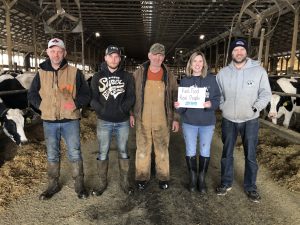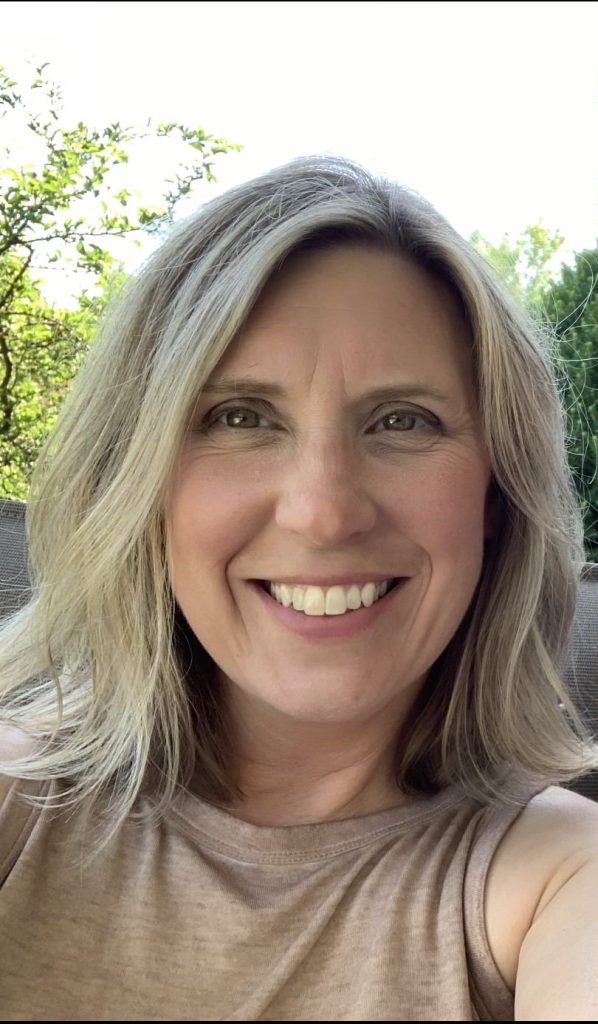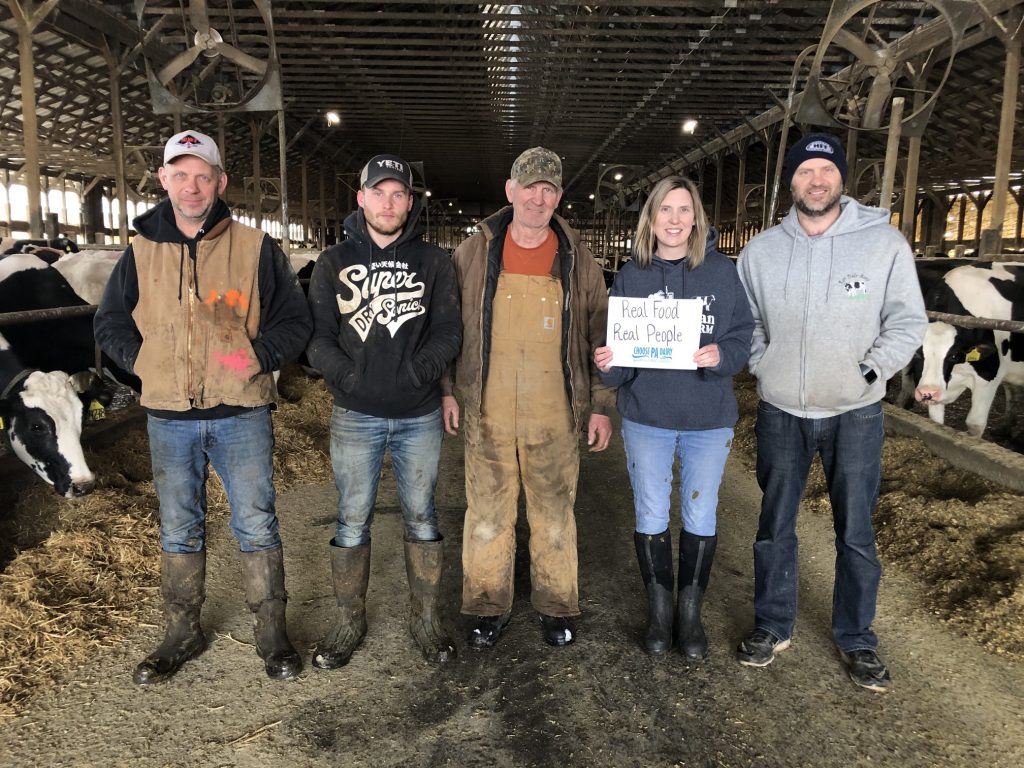
Trisha Adams Was Interviewed in the New Episode of “Cow-Side Conversations”
In the Center for Dairy Excellence’s latest episode of the “Cow-Side Conversations” podcast, Trisha Adams of Hoffman Family Farms, LLC in Potter County, Pennsylvania describes their family business and how Potter County’s unique terrain impacts their growing season and dairy management practices. With a strong presence in their local community, Trisha shares some of the meaningful ways they connect with their community all year long. From hosting farm tours and providing whole milk at youth events to managing a growing beef enterprise on their farm, Trisha offers simple ways to connect with families in the surrounding community throughout the podcast interview.
Trisha opens the podcast by describing the size and scale of their dairy operation. Located in Shinglehouse, PA in Potter County, the family milks just under 1,000 cows and farms approximately 2,000 acres of cropland. Trisha is in partnership with her three brothers, Keith, Brad and Josh. The siblings formed a limited liability corporation (LLC) after their parents transitioned ownership of the farm in 2018. Trisha focuses on calf care, managing the farm’s social media and community relationships, and the beef retail shed, while her brothers each have specific roles as well.
“When we transitioned, we were big enough to each have our own role to play where we’re not on top of each other. My oldest brother, Keith, is the head herdsman and does all the cow care, milking, and breeding. My second brother, Brad, is the crop guy. He’s the one out in the tractor figuring out what to plant and making those decisions. He’s also in charge of our secondary heifer facility,” Trisha shares in the podcast. “I do a lot of the calf care, social media and employee scheduling. My younger brother, Josh, is the numbers guy. He is very good with computers and does all the IT and networking – he’s the guy behind the scenes.”
Trisha says her parents are also on the farm helping make decisions every day. Some of those decisions involve diversification and a growing beef enterprise.
“We’re at full capacity. Our barns are full, and we have all the land accounted for that we can get. We don’t really see ourselves growing anymore dairy-wise. Right now, we’re managing those numbers as is and we’re trying to diversify,” Trisha explains. “With diversifying, it’s kind of scary because we’ve only ever really known dairy. We have slowly transitioned to our beef retail shed, and we purchased some land over the last few years. We’re weighing some options for that.”
Potter County is known for its beautiful seasons, but it can have challenges with the terrain and weather patterns. During the podcast, Trisha describes the different seasons and growing conditions. In the winter, they can sometimes experience Great Lake effects, including a lot of snow accumulation. Spring can be very wet and cold, summer is often hot and dry, and fall can be extremely short. In the midst of these weather patterns, they average 75-85 day corn. Trisha shares some of the innovative cropping decisions her brother and nephew make to navigate the unique terrain, including planting corn in narrow rows and a grid-like pattern.
“We experience every season to the extreme sometimes. We can also have early or late frosts. We’ve had a frost as late as June 14th and a frost as early as September, so our growing window is very short. We can grow stuff — you just have to be on your toes,” Trisha says. “My brother and nephew are always taking chances [with the crops]. Not bad chances, but they take risks. The corn is actually in 15-inch rows, so that’s something unique. It has paid off, especially the last few years when our summers have been dry and hot with a heavy dew. The 15-inch rows have allowed our corn to grow great even in these dry summers. The root system seems to do better that way for us.”

In terms of calf care, Trisha says she follows a strict regimen. All newborn calves get colostrum, Tri-Shield First Defense, and their navels are dipped. The calf barn has curtained side walls and a lot of ventilation. Calves are individually housed in pens, and they come apart to be cleaned between each weaning. With the farm being at full capacity, Trisha aims to wean calves at approximately 8-10 weeks. She also feeds them three times per day.
“We pasteurize our waste milk, and we put it in a golf cart. We drive it down every day, three times a day, to feed the calves. People are in [the calf barn] a minimum of 3-5 times a day. The calves are always getting cared for,” Trisha shares. “I think that third feeding has really helped us and helped them grow bigger and quicker. We don’t have many deaths, and the health rate is really good.”
With a new retail “beef shed” to sell beef directly to their community, Trisha says they are currently breeding about 60 percent of their herd to Angus. Some are sold to market, while they raise at least one a month for their beef enterprise. They focus on both Holstein and Angus crosses, and they are licensed with freezers and pick-up options directly on the farm. Trisha also gets creative with marketing and bundle options for consumers, including seasonal meat variety packs for summer grilling weather or winter crock-pot season.
“We strive to do things the correct way to make sure everything is licensed. It has been growing pretty successfully the last year,” Trisha adds in the podcast.
Trisha and her family also open up their farm multiple times a year for classrooms, families, FFA groups, and church groups. Their goal is to be as open and welcoming as possible with their community and show what a working dairy farm is like.
“I made it a mindset that we open our farm up to show what farm life is about. We can be the voice if someone has a question. That’s what we’re all about. If you have a question, ask us. There’s no dumb question,” Trisha says. “We’re happy to tell you why we do what we do. I’m also one to say, ‘Not every farm does it this way. Just because they don’t does not mean they’re wrong. Every farm does what works for them.’”

She focuses on providing visitors with hands-on, memorable experiences such as touching the feed, holding a bottle, or feeding the calves. Trisha and her family also offer whole milk and ice cream to groups that tour the farm to open up the dialogue around dairy products, taste and nutrition.
“I want them to have a good experience so they walk away learning something. I want to offer certain [products] to bring those questions to me. It opens up the conversation and opens up their minds. I want them to feel like it’s an open line of communication,” she explains.
Trisha closes the podcast by offering advice for other farms who want to connect with their community:
- Be honest and open-minded. “You need to understand and be open-minded that not everyone grew up with this experience [living on a farm]. They’re going to ask questions that might annoy you. You have to be prepared for all types of questions and answer them honestly with reasons and facts to back it up. When you do that, they can trust your answer and understand more. That’s a mindset you should have when you give a tour.”
- Embrace the challenges. “Opening up your farm can be very challenging, especially if it just got done raining, if it’s cold, or hot and dusty. Some of that is out of your control, but embrace them.”
- Keep it simple and start small. “Start on a smaller scale, and do what works for you. Maybe just do ground beef and steaks to start. Get your license, do your research, and make sure you do it the right way. Make sure you’re articulate in the messages you’re sharing. Think about the food or the milk you want to serve.It doesn’t have to be huge – it just has to be what works for you.”
- Bring them along for the ride. “We have to operate and farm in the community. It’s so much better to have good relations than bad relations. Obviously not everybody is going to understand, but if you bring them along for the ride and share what you’re doing — and you give to the community – it seems to be so much better in end.”
To listen to the full podcast interview with Trisha, visit www.centerfordairyexcellence.org/podcast. The podcast is also available on Spotify, Apple Podcasts, and Amazon Music. With a new episode released each month, Trisha’s interview is the eighth episode in the third season. The podcast was designed to share real-time farmer insight, tricks of the trade, and inspiring stories from dairies across Pennsylvania.

